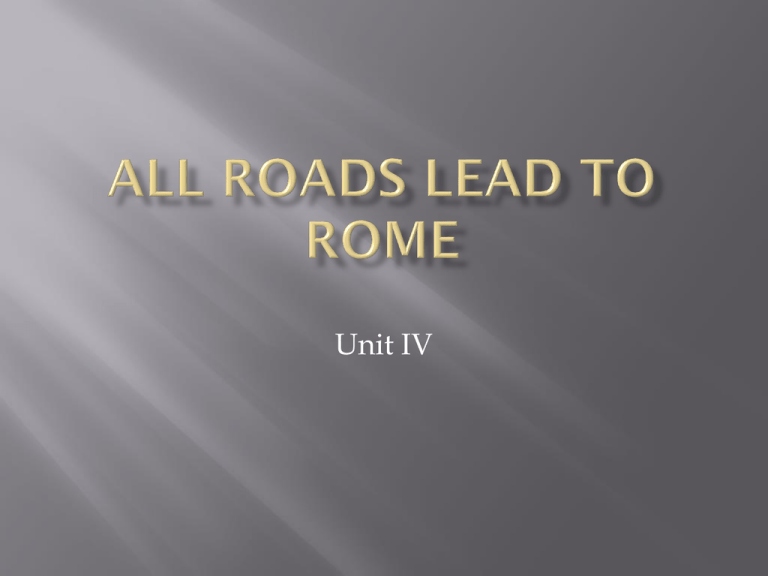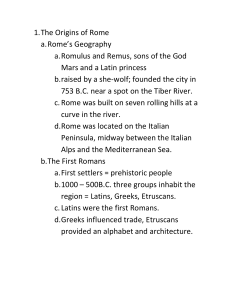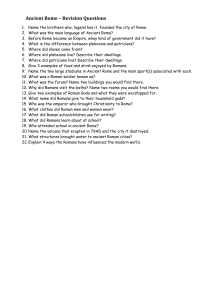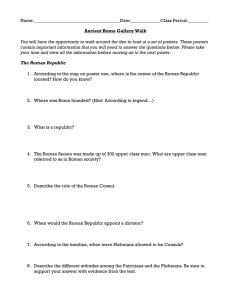Roman World Takes Shape
advertisement

Unit IV Latin's migrated into Italy about 800 BC. The Romans shared the Italian peninsula with Greek colonists. Etruscans- ruled central Italy, including Rome. Romans borrowed their alphabet from the Etruscans. Etruscan Gods merged with Roman deities PEOPLE: The Latins -Rome: “The First Romans” The Etruscans -Northern Italy -Urbanized Rome: Building Programs (the Forum) -Influence on Romans: the arch, alphabet The Greeks -Southern Italy and Sicily -Influence on Romans: art, architecture, literature, ..government, engineering GEOGRAPHY: -Tiber River & Mediterranean Sea -Fertile Soil & Strategic Location Rome began as a small city-state in central Italy. Geography of Italy made unifying Italy as one nation much easier then Greece Very fertile growing areas Central Location in the Mediterranean 509 B.C., Romans rejected Etruscan king (monarchy) and established a republic. Power rests with the citizens who have the right to vote for their leaders. In Rome, citizenship with voting rights was granted only to free-born male citizens. STRUGGLE FOR POWER: CLASS CONFLICT Patricians- wealthy landowners who held most of the power: inherited power and social status Plebeians- (Plebs) common farmers, artisans and merchants who made up the majority of the population: can vote, but can’t rule Tribunes- elected representatives who protect plebeians’ political rights. 2 Consuls (Rulers of Rome) Senate (Representative body for patricians) Tribal Assembly (Representative body for plebeians) A “Balanced” Government Rome elects two consuls– one to lead army, one to direct government Senate- chosen from patricians (Roman upper class), make foreign and domestic policy Popular assemblies elect tribunes, make laws for plebeians (commoners) Dictators- leaders appointed briefly in times of crisis (appt. by consuls and senate) Typical during times of War Plebeians were the lower class, farmers, merchants, artisans, and traders. 1st Breakthrough- 12 Tables 2nd Breakthroughtribunes- could veto, or block those laws that were harmful to the Plebeians. Eventually Plebeians were elected to offices of high importance THE TWELVE TABLES 451 B.C., officials carve Roman laws on twelve tablets and hung in Forum. Laws confirm right of all free citizens to protection of the law Become the basis for later Roman law Family was the basic unit of Roman society. Father had absolute rule in the family Women were expected to follow husbands authority. Roman women did however have a larger role in society then did Greek women. Girls and boys alike learned to read and write. By the late Republic, many wealthy Romans were hiring Greeks as private tutors for their children. Roman Gods resembled those of the Etruscans and Greeks. Like the Greek god Zeus, the Roman god Jupiter ruled over the other gods. Roman Gods Jupiter Mars Juno Venus Diana Saturn Minerva Mercury Pluto Neptune Vesta Greek Gods Zeus Ares Hera Aphrodite Artemis Bacchus Athena Hermes Hades Poseidon Hestia




